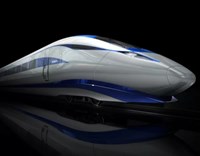
Hitachi Rail Europe and Bombardier Transportation have officially announced they will rekindle a working partnership to build high-speed trains – this time for what will be Europe’s largest infrastructure project: HS2. The two companies, which were first listed for the contract by the UK government’s Department for Transport (DfT) in November 2017, dropped their usual business rivalry to form the only partnership of the five shortlisted bidders. Alstom (France), Construcciones y Auxiliar de Ferrocarriles (CAF) (Spain), Patentes Talgo (Spain) and Siemens (Germany) make up the other four.
The Japanese and Canadian companies, both of which have production facilities in the UK, have said that the collaboration would “bring together a deep understanding of very high speed rail”, building on the partnership they formed to construct one of Europe’s fastest trains: Trenitalia’s 250-mph ETR 1000. The tendering process is planned to start later in 2018, with a final decision made in late 2019.
The trains which will operate on the new line – connecting London with Manchester and Leeds via Birmingham – will be required to reach speeds of 225mph (360kph) and are intended to enter service in the early 2020s. Hitachi and Bombardier will hope that their joint pedigree of building high-speed trains (above 155mph, or 250 kmh, in the case of new trains) hold them in good stead; Hitachi built the original Shinkansen bullet train in Japan in 1964, and Bombardier has built more than 3,000 high speed train carriages for Chbina.
From Hitachi, its managing director Karen Boswell, said the partnership’s aim is to “deliver a new British icon that will be recognised around the world”. Richard Hunter, Bombardier’s UK managing director, said the contract represented something that would spell good news for the UK as a whole. “HS2 is a once-in-a-lifetime opportunity to transform the nation’s transport network. By joining together in partnership with Hitachi we will help generate skills and prosperity across a number of UK regions,” said Hunter.
The DfT has stated that a compulsory requirement of the HS2 bidding process is that production of the trains takes place in the UK, with the intention that the new employment would breathe new life into the area where the trains and supporting infrastructure are built. Hitachi moved their European production facilities to the UK in 2013 with the creation of its £82 million plant in Newton Aycliffe, while Bombardier is able to call on a 340,000 m² production facility in Derby.
Meanwhile, among the competing bidders, Alstom has production facilities in Widnes, Cheshire, which opened in June 2017; Spain's CAF has a 15,000 m² factory in Newport, Wales; Patentes Talgo, an outsider for the HS2 contract, said in October 2017 it was looking for a suitable UK site; and Siemens is looking to build a new plant in Goole, Yorkshire, dependent on the company “securing major future orders”.
About SmartRail World
 The hub of our global community, SmartRail World is the online home of cutting edge rail and metro technology. Since our launch in Summer 2013, we’ve had a focus on the growth of digital technology within the industry – from signalling and telecommunications to fare collection and passenger experience. We are relentlessly focussed on the future, as are our global community. Our readers come to us to learn about the latest industry news trends and developments, and how they can use them on their own rail and metro networks or with their products and services. Updated daily, by our in-house editorial team, SmartRail World delivers news stories, features, interviews, videos, specialist publications and industry intelligence to our global community of highly engaged industry professionals.
The hub of our global community, SmartRail World is the online home of cutting edge rail and metro technology. Since our launch in Summer 2013, we’ve had a focus on the growth of digital technology within the industry – from signalling and telecommunications to fare collection and passenger experience. We are relentlessly focussed on the future, as are our global community. Our readers come to us to learn about the latest industry news trends and developments, and how they can use them on their own rail and metro networks or with their products and services. Updated daily, by our in-house editorial team, SmartRail World delivers news stories, features, interviews, videos, specialist publications and industry intelligence to our global community of highly engaged industry professionals.




Comments
There are no comments yet for this item
Join the discussion